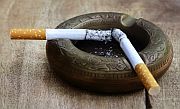
WEDNESDAY, July 15, 2015 (HealthDay News) — New research suggests that exposure to secondhand smoke may increase nonsmokers’ risk of stroke by nearly one-third.
“Our findings suggest the possibility for adverse health outcomes such as stroke among nonsmokers exposed to secondhand smoke and add to the body of evidence supporting stricter smoking regulations,” said lead author Angela Malek, of the Medical University of South Carolina in Charleston.
Researchers analyzed data from nearly 22,000 white and black American adults older than 45. About 23 percent said they were exposed to secondhand smoke in the previous year.
Between April 2003 and March 2012, there were 428 strokes among the study participants. There were 352 ischemic strokes (blockage of blood flow to the brain), 50 bleeding (hemorrhagic) strokes, and 26 strokes of unknown subtype.
After adjusting for other stroke risk factors — such as diabetes, high blood pressure and heart disease — the researchers found that exposure to secondhand smoke was linked to about a 30 percent increase in nonsmokers’ risk of stroke.
However, the association seen in the study does not prove a cause-and-effect relationship.
The study was published recently in the American Journal of Preventive Medicine.
“Future research will need to investigate the role of cardiovascular disease risk factors in the association and explore potential exposure to additional environmental variables, such as ambient air pollutants, in relation to stroke,” Malek said in a journal news release.
Each year, nearly 800,000 Americans suffer a stroke. Strokes cause one of every 19 deaths in the United States and are a leading cause of disability.
More information
The U.S. Centers for Disease Control and Prevention has more about secondhand smoke.
Copyright © 2026 HealthDay. All rights reserved.

